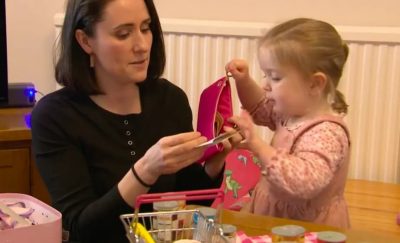
As the cost of living crisis starts to bite, one young Bridgwater mum took to the T V screen to tell of her own experiences trying to cope. Meg Boucher was interviewed by ITV News recently and explained how despite having two jobs she still struggles to make ends meet . We asked Meg for her thoughts on the cost of living crisis and what she thought might be the solutions. Meg, a Labour Party member, is considering standing for election in May .

Meg writes ;- It doesn’t take much retrospective thought to recall what life was life for the average family on a Sunday just a few years ago – The family trip to the freezing football field or local park to watch a valued family member get ‘stuck in’ with other children from the community (and the inevitably muddy journey home), the trip to the beach on a pleasantly warm afternoon with nothing but a spade and towel in hand; the allocation of quality time spent together, building relationships and memories. These sorts of memories usually culminate in the promise of a roast dinner (or a similar culinary delight!) and the chaotic but fond time sat around the table devouring it together.
Devastating impact

Whilst it is important to consider that this will not have been a blanket experience of family life, recognising there have always been those who have struggled to make ends meet due to circumstances or low income, it is crucial for us to turn our attention to the devastating impact that the increase in cost of living is having on the average family life. Amid the national rise in inflation, the rising cost of living means most households will on average be paying around £200 per year more on groceries than a year ago. This will lead to inescapable choices for families; what has to be removed from the weekly food shop? Where can we make cuts to make
ends meet?
In an additional blow to the pockets of families, in April, National Insurance, council tax and gas prices are set to rise. The question is no longer ‘will’ but at ‘what’ point will families reach breaking point? As a mother to a 2year old child who has the ability to out-eat an entire zoo worth of hefty animals (not to mention her switch in food preference tendencies, nappies, ever needing clothes, shoes and child care costs…), I am now finding it next to impossible to budget – because the prediction is the income won’t match the outgoings. This year alone, the consumer price index measured a rise of 5.5% on everyday items – the biggest increase since the early 90s. It’s no wonder we are beginning to see an impact.
‘Eat or Heat’

In my role as family worker for a local church, I am beginning to see a much wider group of people struggling to maintain their standard of living. Those who could be considered to be ‘just about managing’ are now finding themselves in the struggling category. The option to act charitably and take something to the foodbank has turned to ’Actually, this is affecting our budget now. We’re struggling as well.’ For those who were already firmly placed in the struggling category, the reality of daily life could become unimaginable if they are left to face choices such as ‘eat or heat?’
The concern stretches into the health and well-being of our children and young people – Will parents have to make the choice to cut extra- curricular activities which may provide an outlet for physical exercise, mental-wellbeing and socialisation? Will the additional cost of experience- based activities such as dance classes, football clubs and swimming become and unrealistic line in the family budget?
Admiration and Respect

Whilst great admiration and respect should be attributed to organisations such as the food bank (Trussell trust) local food pantries and youth organisation providing free activities, the responsibility to patch the ever- widening gap of food poverty and experiential loss for families should not fall on the under-funded and under-valued voluntary and charitable sector.
Our community is crying out for a government who considers the needs of real family life – not a disconnected group of individuals who seek to buffer an unfair system. We are desperate for an infrastructure which will put a halt to universal basic needs (such as food and heat) being turned into commodities which only line the pockets of these who already enjoy vast amounts of wealth and comfort. Local people deserve public servants who will work tirelessly to find community based, cooperative solutions to combat deprivation, isolation and marginalisation.
